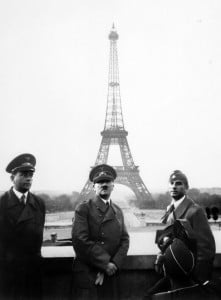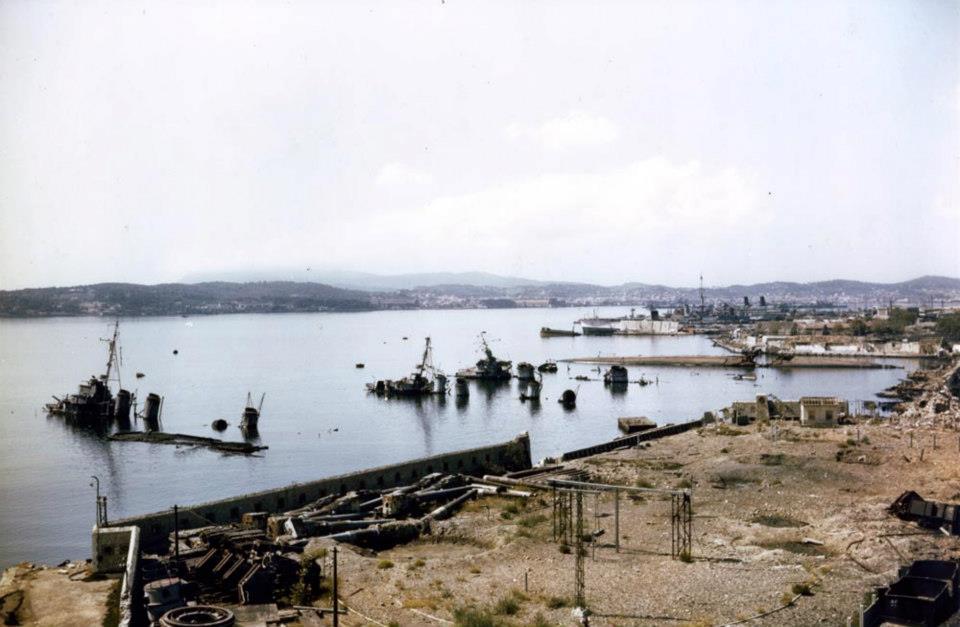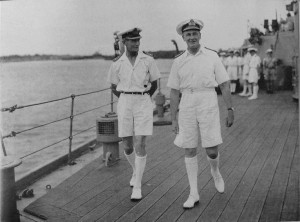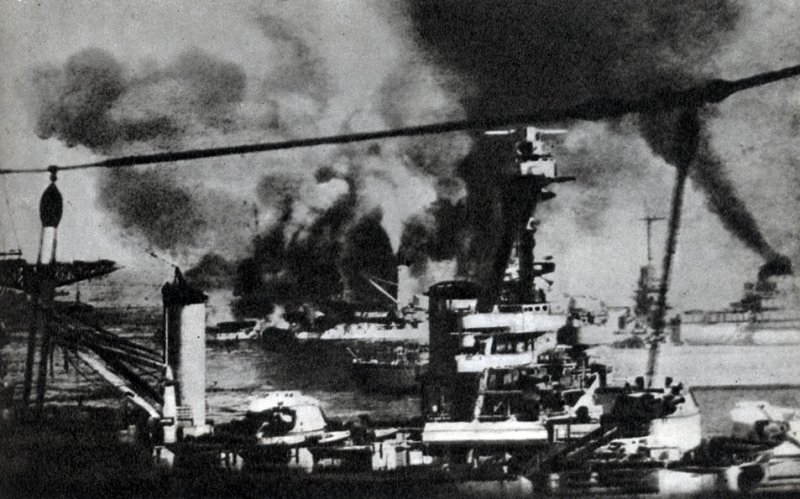History of World War II: Adolf Hitler Was Not Planning to Go to War against Britain and France?

Image: Adolf Hitler in vanquished Paris, June 23 1940
Nothing must be done between England and Germany which would in any way violate the prestige of Great Britain. Adolf Hitler[1]
When Hitler realized that his original idea, the creation of a powerful Reich of all Germans allied to Britain, could not be realized, he tried to build and secure
this Reich with his own military resources. In this way he created for himself a world of enemies. Joachim von Ribbentrop[2]
…On June 22, 1940, France surrendered. The French naval fleet was disarmed. However, no documents were signed ordering French warships to be transferred or handed over to the Germans. France promised only to suspend her war against Germany. Nevertheless, was Hitler perhaps planning to seize France’s ships in some underhanded way? No, he definitely was not. Germany’s demands in victory were quite modest and did not even remotely resemble the outright mugging inflicted by the Allies at Versailles.
And why was that?
That was because Adolf Hitler was never planning to go to war against Britain and France.
And even now, after defeating the French, he was not really interested in looting as much as convincing those countries to join his cause, which eventually should have led to the long-awaited peace with Great Britain. Hitler had not planned any further war with the West. On the contrary, the Führer was prepared to sign a peace treaty with London. And the English would find the terms of that future peace deal to be quite acceptable. Hitler had no desire to strip the British bare or to deprive them of their position as the rulers of the world. The Führer wanted to lay the foundation for an eternal German alliance with Britain. “So certain was he that the British would agree to this that even after the fall of France he made no plans for continuing the war against Britain,”[3] writes William Shirer, an American journalist who worked inside the Third Reich.
The idea that the German leader wanted to conquer Britain after his seizure of France is nothing but the product of the overexcited imagination of Western historians. Neither Hitler nor any of the highest commanders of the German armed forces were preparing to fight the British. On June 20, 1940, Admiral Raeder asked his Führer, “And now how about the British?” But he got no answer. Ten days later, the chief of the Wehrmacht Operations Staff, General Jodl, submitted a memorandum to Hitler, which declared that the war against England must be waged politically.[4] Incidentally, Alfred Jodl, who was later hanged at Nuremberg, was responsible for strategic planning for the German army.
However, the idea of a peaceful end to the war against their protégé Adolf Hitler had no place in the British plans. In the summer of 1940, the tenets of the British policy were unchanged: billions of pounds had not been spent so that Nazi Germany could become an equal partner to the gentlemen in London. After all, the war with Russia/USSR had not yet been launched.
“Making peace” with the Führer meant that Britain would lose her position of global hegemony in the most offensive and stupid way possible: by creating a geopolitical rival with their own hands and then sharing world dominion with him. The British wanted nothing to do with that sort of peace. They would fight, and fight hard. There is no place for sentimentality when faced with the prospect of losing control over the world. Britain’s determination was manifest in the resolute words of her prime minister, “if necessary for years, if necessary alone.”[5]
Operation Catapult was drafted by the British in an unprecedentedly short period of time and launched only 11 days after the surrender of France. The irony of that situation lay in the fact that this time the British were attacking an ally, not an enemy. An ugly scene played out on the decks of the French warships docked in the English ports of Portsmouth, Plymouth, and Devonport.
Naturally the French sailors did not expect to be ambushed by their comrades-in-arms. “The action was sudden and necessarily a surprise,” Churchill would later write.[6] All the French ships: two battleships, four cruisers, eight destroyers, 12 submarines, and about 200 minesweepers and submarine chasers – were captured by the British early on the morning of July 3, 1940. The attack was so unexpected that only the crew of the submarine Surcouf managed to put up any sort of armed fight. The French crews were forcibly put ashore and interned “not without violent incidents.”[7] Acting like pirates, the Brits seized vessels that were then added to the English Navy …
But the real tragedy did not unfold in British ports, but rather where the French fleet was moored in Oran, Mers-el-Kébir, and Dakar. On that same morning of July 3,[8] a British squadron commanded by Admiral James Somerville approached Oran. French Admiral Marcel Gensoul, the commander of the French fleet, was given a final ultimatum by the British. He could:
- continue to fight against Germany and Italy as part of the British fleet
- move the ships to British ports while returning the French crews to France, and the ships would remain in British hands until the end of the war
- move the ships to the French West Indies or flood them within 6 hours.[9]
If Gensoul found none of these options acceptable, he could “disarm” right where his ships were moored, but only if he did so “effectively.” This meant that the French were being asked to wreck their own ships under British supervision. As the commander of a formation of the newest and most powerful ships in the French navy, and sitting in a home port, how would you have responded to such proposals, coming from yesterday’s “comrades-in-arms” no less?
Admiral Gensoul rejected the British ultimatum. This was reported to Churchill, and at 18:25 (on the eve of the expiration of the ultimatum) the commander of the British squadron was given the final order from his prime minister: “French ships must comply with our terms or sink themselves or be sunk by you before dark.”[10]
However, with surprise as his goal, British Admiral Somerville suddenly opened fire, without waiting for the ultimatum to expire! At 18:00, he radioed that he was already engaged in battle.The French sailors never expected the British ships to actually begin shooting at them, but that was what was happening! It was neither a fight nor a real naval battle. The French sailors, who were completely unprepared to repel the attack, were executed. “… The ships in Oran were not able to fight. They were anchored, with no room to maneuver or scatter. The position of our ships meant that the British vessels could fire the first shots, which as we know is crucial at such distance at sea. The French ships were not destroyed in a fair fight.”[11]
The battleship Bretagne, which was moored in Oran, took a direct hit in her magazine, exploded, and sank into the depths of the sea within minutes. The battleship Provence was severely damaged and beached herself; the battleship Dunkerque had little room to maneuver and ran aground. Although damaged by British torpedo bombers, the battle cruiser Strasbourg still managed to break through the English squadron, along with five destroyers and several submarines, to reach her native shores under fire.
The British Admiralty could feel at ease: all the newest French battleships were now out of commission. The last of these, the Richelieu, moored in Dakar, was attacked by British torpedo bombers from the aircraft carrier HMS Hermes and badly damaged. Altogether about 1,300 Frenchmen were killed during Operation Catapult.[12] In response to this betrayal, the French government severed diplomatic relations with England, without declaring war.
But could the Germans have captured the French fleet? There was no chance. It was not until Nov. 26, 1942, two years after Operation Catapult, that German troops first tried to do this as they entered Toulon.[13] The French fleet stationed there was scuttled at the order of the Vichy government. Three battleships, 8 cruisers, 17 destroyers, 16 torpedo-boats, 16 submarines, 7 sloops, 3 patrol boats, and 60 transports, trawlers, and tugboats sank into the sea.[14] As you can see, the French never flinched. Why? Because they were never German puppets and were never prepared to surrender their fleet – not to the Germans and not to the British. Although on the eve of the traitorous British Operation Catapult, France had given Churchill a promise that under no circumstances would her warships fall into German hands …
To be continued

Major French Naval base Toulon, photo taken in 1944. Submerged hulls of VSS Tartu, Cassard, L’Indomptable, Vautour, Aigle, Condorcet are seen.
ORIENTAL REVIEW publishes exclusive translations of the chapters from Nikolay Starikov’s documentary research ““Who Made Hitler Attack Stalin” (St.Petersburg, 2008). Mr. Starikov is Russian historian and civil activist. The original text was adapted and translated by ORIENTAL REVIEW.
Notes
[1] F. H. Hinsley. Hitler’s Strategy. Pg. 81.
[2] Joachim Ribbentrop. The Ribbentrop Memoirs. Pg. 141.
[3] William Shirer. The Rise and Fall of the Third Reich. Pg. 747.
[4] MacGregor Knox. Mussolini Unleashed, 1939-1941: Politics and Strategy in Fascist Italy’s Last War. Pg. 183.
[5] Winston Churchill. The Second World War. Their Finest Hour. Pg. 197.
[6] Winston Churchill. The Second World War. Their Finest Hour. Pg. 207.
[7] Charles de Gaulle. Mémoires de guerre. Pg. 110.
[8] The British had to hit the French fleet simultaneously in all ports, in order not to lose the element of surprise inherent in their vow to destroy the ships.
[9] David Thomas. Battles and Honours of the Royal Navy. Pg. 278.
[10] Brooke C. Stoddard. World in the Balance: The Perilous Months of June-October 1940. Pg. 74.
[11] Charles de Gaulle. Mémoires de guerre. Pg. 321.
[12] John Grehan. Churchill’s Secret Invasion : Britain’s First Large Scale Combined Operations Offensive 1942. Pg. 7.
[13] Shortly before this, the British and Americans had landed in Algiers, i.e., a French colony in Africa. Fiercely resisting the Anglo-Saxons at first, the French Admiral François Darlan later began cooperating with them. Thus Germany was forced to occupy the remainder of “free” France, in order to prevent a potential invasion by the British and Americans.
[14] Charles de Gaulle. Mémoires de guerre. Pg. 59.
PREVIOUS EPISODES
Episode 16. Who signed death sentense to France in 1940?
Episode 14. How Adolf Hitler turned to be a “defiant aggressor”
Episode 13. Why London presented Hitler with Vienna and Prague
Episode 12. Why did Britain and the United States have no desire to prevent WWII?
Episode 11. A Soviet Quarter Century (1930-1955)
Episode 10. Who Organised the Famine in the USSR in 1932-1933?
Episode 9. How the British “Liberated” Greece
Episode 7. Britain and France Planned to Assault Soviet Union in 1940
Episode 6. Leon Trotsky, Father of German Nazism
Episode 5. Who paid for World War II?
Episode 4. Who ignited First World War?
Episode 3. Assassination in Sarajevo
Episode 2. The US Federal Reserve



